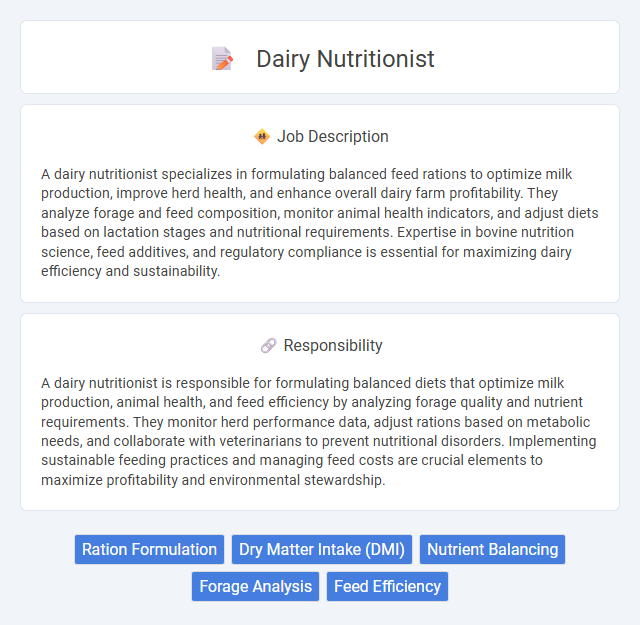
A dairy nutritionist specializes in formulating balanced feed rations to optimize milk production, improve herd health, and enhance overall dairy farm profitability. They analyze forage and feed composition, monitor animal health indicators, and adjust diets based on lactation stages and nutritional requirements. Expertise in bovine nutrition science, feed additives, and regulatory compliance is essential for maximizing dairy efficiency and sustainability.
Individuals with a strong background in animal science or nutrition are likely suitable for a dairy nutritionist role, as it requires expertise in optimizing dairy cattle diets for health and productivity. Those who enjoy working in agricultural environments and can analyze data to improve feed efficiency may find this job fitting. People lacking interest in livestock management or struggling with scientific concepts related to animal nutrition might find this role less suitable.
Qualification
A dairy nutritionist typically requires a bachelor's degree in animal science, dairy science, nutrition, or a related field, with many employers preferring a master's degree for advanced roles. Certification such as the American Registry of Professional Animal Scientists (ARPAS) or board certification in animal nutrition enhances credibility and job prospects. Strong knowledge of ruminant nutrition, feed formulation, and animal health management is essential for optimizing dairy production and maintaining herd well-being.
Responsibility
A dairy nutritionist is responsible for formulating balanced diets that optimize milk production, animal health, and feed efficiency by analyzing forage quality and nutrient requirements. They monitor herd performance data, adjust rations based on metabolic needs, and collaborate with veterinarians to prevent nutritional disorders. Implementing sustainable feeding practices and managing feed costs are crucial elements to maximize profitability and environmental stewardship.
Benefit
A Dairy nutritionist likely improves herd health and milk production by formulating balanced diets tailored to specific herd needs. This role may enhance feed efficiency, reducing costs and environmental impact, while potentially increasing profitability. Employers probably benefit from the expert insights leading to sustainable farm management and better overall dairy performance.
Challenge
A Dairy Nutritionist likely faces the challenge of balancing the nutritional needs of livestock with cost-effective feed formulations that optimize milk production. Managing variations in feed quality and availability may require constant adjustments to diets to prevent health issues and maintain productivity. The complexity of aligning animal health, environmental sustainability, and economic factors often creates a demanding and dynamic work environment.
Career Advancement
Dairy nutritionists play a crucial role in optimizing livestock health and milk production through specialized dietary plans. Career advancement in this field often involves gaining experience in herd management, research, and consulting, leading to positions such as senior nutritionist or agricultural consultant. Pursuing advanced degrees and certifications in animal science or nutrition further enhances opportunities for leadership roles and industry specialization.
Key Terms
Ration Formulation
Dairy nutritionists specialize in ration formulation to optimize feed efficiency and improve milk production quality in dairy herds. They analyze nutrient requirements and ingredients, balancing proteins, carbohydrates, vitamins, and minerals to enhance animal health and reduce feed costs. Precision in ration formulation supports sustainable dairy farming by minimizing waste and maximizing nutrient utilization.
Dry Matter Intake (DMI)
A dairy nutritionist plays a critical role in optimizing Dry Matter Intake (DMI) to enhance milk production and maintain cow health. By analyzing forage quality, ingredient digestibility, and ration formulation, they ensure cows receive balanced nutrients that maximize energy efficiency and feed utilization. Precise management of DMI influences milk yield, reproductive performance, and overall herd well-being, making it a key metric in dairy herd nutrition programs.
Nutrient Balancing
A Dairy Nutritionist specializes in nutrient balancing to optimize milk production, animal health, and feed efficiency. They analyze forage, grains, and supplements to formulate precise rations that meet the specific dietary needs of dairy cattle. Nutrient balancing also involves monitoring protein, energy, fiber, vitamins, and minerals to prevent metabolic disorders and improve overall herd performance.
Forage Analysis
Forage analysis plays a crucial role in a dairy nutritionist's job by providing accurate assessments of feed quality and nutrient content, which directly impacts milk production and animal health. Utilizing methods such as Near-Infrared Spectroscopy (NIRS) and wet chemistry, nutritionists can determine fiber, protein, and energy levels in forages to formulate balanced rations. Precise forage evaluation helps optimize feed efficiency, reduce costs, and improve overall herd performance.
Feed Efficiency
A Dairy Nutritionist specializing in feed efficiency develops optimized feeding programs that maximize milk production while minimizing feed costs and waste. Utilizing data on forage quality, nutrient requirements, and animal performance, they formulate rations that improve feed conversion ratios and support herd health. Expertise in balancing energy, protein, fiber, and mineral intake directly enhances productivity and sustainability in dairy operations.
 kuljobs.com
kuljobs.com